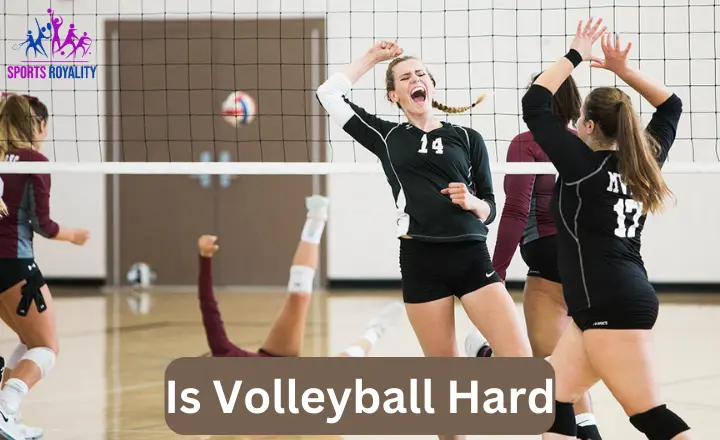Is volleyball hard? This question has been pondered by many, whether they are newcomers to the sport or seasoned players. While some may argue that volleyball is a relatively easy sport compared to others, there are several reasons why it can be considered challenging.
Volleyball can be challenging, especially for beginners unfamiliar with the rules and techniques. It requires physical skills like agility, speed, coordination, and mental skills like strategy and teamwork. The game’s fast-paced nature also adds to its difficulty, as players must react quickly to incoming balls and make split-second decisions.
From the game’s fast-paced nature to the need for quick reflexes and coordination, volleyball demands more than meets the eye. We will explore five key reasons why volleyball isn’t as easy as it may initially seem, shedding light on the complexity and athleticism required to excel in this dynamic sport.
Is Volleyball Considered A Hard Sport?
Yes, volleyball is considered a hard sport due to its fast-paced nature and the physical demands it places on players. The game requires quick reflexes, agility, and coordination, as players must constantly move around the court to anticipate and react to the ball.
Volleyball involves jumping and hitting the ball with power and precision, which requires strength and explosive power. Players also need good teamwork and communication skills to coordinate team plays. Volleyball can be physically and mentally challenging, making it a hard sport to excel in.
It’s important to note that the difficulty level of any sport can vary depending on individual skill level and experience. Some people may find volleyball easier than others based on their natural abilities or previous training in similar sports. For most players, volleyball presents a significant challenge that requires dedication, practice, and perseverance to master.
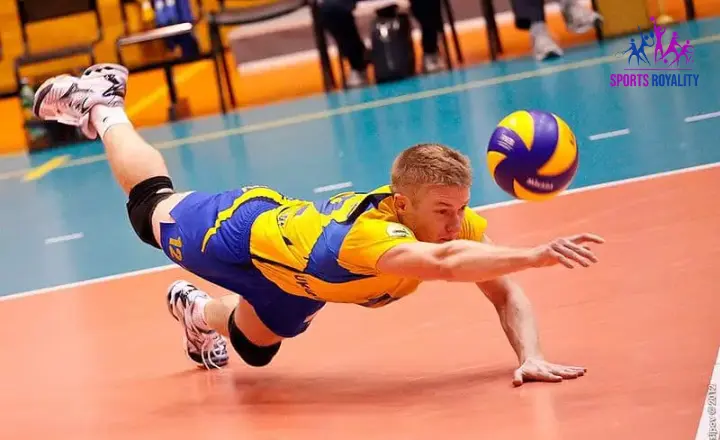
What is So Hard About Volleyball?
Volleyball is challenging due to various factors. Here are 5 main aspects that contribute to the challenge.
Learning The Basic Skills Is Really Hard For Beginners:
Volleyball can be challenging for beginners due to the technical difficulty of learning the basic skills. Unlike some other sports, volleyball requires a combination of hand-eye coordination, timing, and agility. For example, mastering the proper serving, setting, and spiking technique can take time and practice. Understanding the rules and strategies of the game can be overwhelming for newcomers.
The Ball Moves Way Too Quickly:
At the senior men’s level of volleyball, the speed at which the ball moves is indeed incredibly fast. Players can hit balls over 100mph, travelling at over 150 feet per second. This high velocity makes it challenging for defenders to react and keep the ball from hitting the ground.
The combination of speed and trajectory puts defenders under immense pressure to anticipate and position themselves correctly to make successful defensive plays.
Defenders must rely on quick reflexes and excellent court awareness to cope with this challenge. They must constantly analyze the game situation, read the hitter’s body language, and predict where the ball will likely be hit. Defenders must be agile enough to move quickly across the court and have strong communication skills with their teammates to ensure effective coverage.
Dealing with the high speed of the ball requires a combination of skill, experience, and strategic positioning from defenders to successfully defend against powerful hits in senior men’s volleyball.
The Better You Get, The Harder It Becomes:
The main reason is that opponents improve their blocking and serving techniques. As you become a better player, your opponents will also improve at reading your moves and finding ways to counter them. You must constantly adapt and develop new strategies to outsmart your opponents.
That makes volleyball harder as you get better at facing taller opponents. Taller players often have an advantage in reaching higher and hitting the ball with more power. As you progress in volleyball, you will likely encounter more tall players who can make scoring points difficult.
You are Handicapped By Your Height:
While height can play a role in volleyball, it is not the sole determinant of success. While taller players may have an advantage in blocking and hitting, shorter players often possess quickness, agility, and better ball control skills without touching the Net. These attributes allow them to excel in other game areas, such as defence, serving, and setting.
Volleyball is a team sport that requires effective communication, coordination, and strategy. Regardless of height, players must collaborate seamlessly to execute plays and anticipate their opponent’s moves. It means that even if you are shorter, you can still contribute significantly to your team’s success by being a smart player who understands the game well and can make accurate decisions on the court.
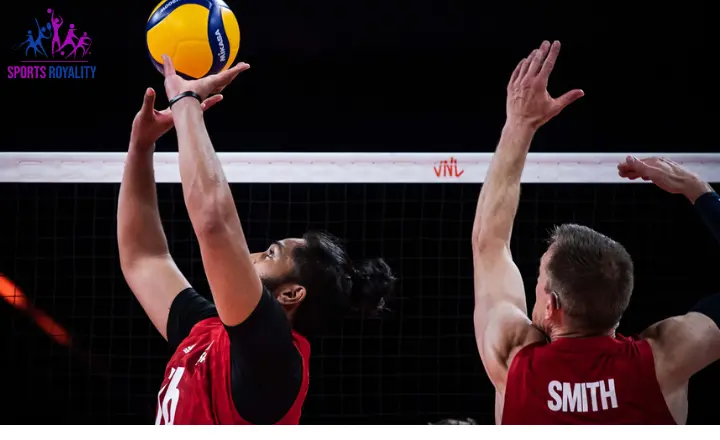
All The Top Players Are Physical Specimens:
While it is true that many top volleyball players possess physical attributes such as height, muscularity, and power, several other factors make the sport challenging. Volleyball requires unique skills, including agility, coordination, speed, and mental acuity.
Players must be able to quickly react to fast-paced movements and anticipate their opponent’s actions. Mastering techniques such as serving, setting, spiking, and blocking requires years of practice and dedication.
Volleyball is a highly team-oriented sport that demands effective communication and collaboration among players. It requires precise timing and synchronization to execute plays successfully. The strategic aspect of the game involves analyzing opponents’ strengths and weaknesses while adjusting tactics accordingly. This mental aspect adds another layer of complexity to the sport.
Is Volleyball Hard On Your Body?
Volleyball can be physically demanding and potentially hard on your body, especially if you do not take proper care and precautions. The game’s repetitive jumping, diving, and hitting movements can strain your joints, particularly your knees and ankles. It can lead to injuries such as sprains, strains, or even more severe conditions like tendonitis.
The nature of volleyball requires quick changes in direction and sudden stops, which can increase the risk of ankle sprains or ligament tears. The impact from landing after jumps can also contribute to stress fractures in the feet or shin splints. Maintaining good conditioning, wearing appropriate footwear with proper ankle support, warming up before playing, and listening to your body’s signals to prevent overuse injuries are crucial.
While volleyball is a fun and exciting sport that offers numerous health benefits, such as improved cardiovascular fitness and coordination skills, it is important to be mindful of the potential strain it can place on your body. By practising proper technique and taking necessary precautions, you can minimize the risk of injury and enjoy playing volleyball safely.
What Is The Hardest Volleyball Position?
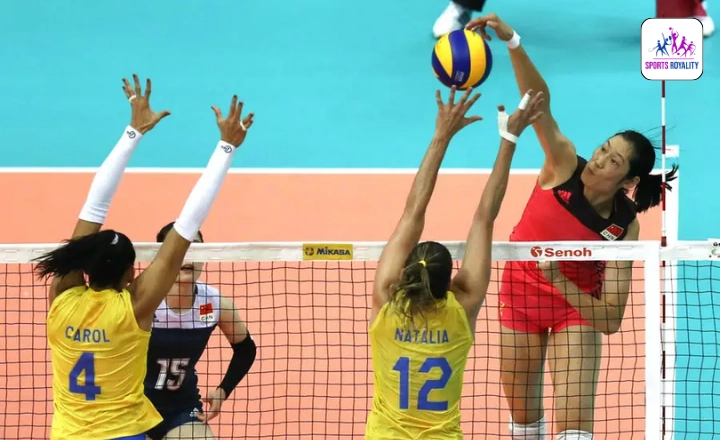
The hardest volleyball position is the setter. Setters are central to every play and shoulder far more responsibility than other players on the court. They are responsible for accurately setting up the ball for their teammates to attack, which requires precise timing and decision-making skills. Setters must have excellent hand-eye coordination and be able to quickly assess the situation on the court to make split-second decisions on where to set the ball.
Setters need to have strong leadership skills and effectively communicate with their teammates. They are often responsible for calling plays and directing the offence, which requires a deep understanding of the game and the ability to read the opposing team’s defence. The pressure on setters is immense as they must consistently deliver accurate sets while under pressure from opposing blockers and defenders.
Is Volleyball Hard To Learn?
Volleyball can be challenging to learn, especially if you are new to the sport or have limited experience with team sports. It requires physical skills such as hand-eye coordination, agility, and strength and mental skills like strategy and communication. Mastering the specific techniques and rules of the game can take time and practice.
With dedication and proper training, volleyball can become easier to grasp. Many beginners find that joining a recreational league or taking lessons from a qualified coach can greatly accelerate their learning process.
Practising regularly with a team or independently can help improve your skills and understanding of the game. While volleyball may initially have a steep learning curve, it is possible to become proficient with time and effort.
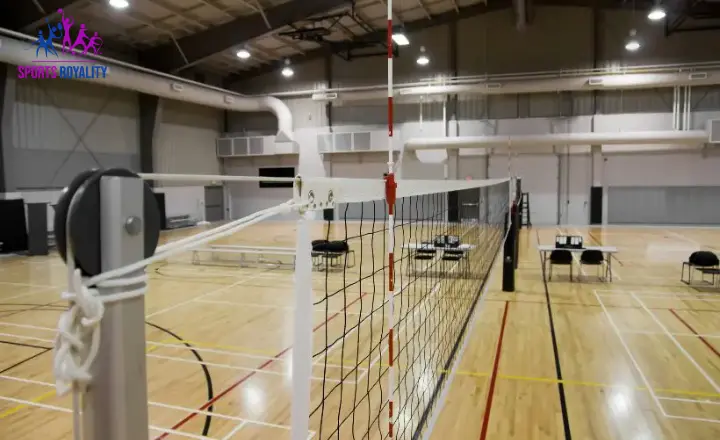
Is Beach Volleyball Harder Than Indoor?
Beach volleyball is much tougher than indoor volleyball due to various reasons.
- Physical demands: Beach volleyball requires players to constantly move on the sand, which is much more challenging than playing on a solid indoor court. The uneven surface and resistance of the sand make it harder to jump, dive, and change direction quickly.
- Stamina and endurance: The longer rallies and extended matches in beach volleyball require players to have exceptional stamina and endurance. With only two players per team, there is more ground to cover, leading to increased fatigue.
- Elements of nature: Unlike indoor volleyball, beach volleyball is played outdoors, exposing players to weather conditions like heat, wind, and sun glare. These elements can significantly affect gameplay and add challenges for the athletes.
- Mental toughness: Playing beach volleyball requires strong mental focus and adaptability due to the constantly changing conditions of the sand, weather, and opponent strategies. Players must quickly adjust their tactics and maintain composure under pressure.
- Communication skills: Effective communication becomes even more crucial with only two players per team in beach volleyball. Players need excellent teamwork and coordination since there are no designated positions like in indoor volleyball.
- Versatility: In beach volleyball, players must possess a wide range of skills as they are responsible for offensive and defensive plays. They must be proficient at serving, setting, hitting, blocking, digging, and passing.
- Tactical complexity: The dynamics of beach volleyball differ from indoor due to the smaller court size and fewer players involved.
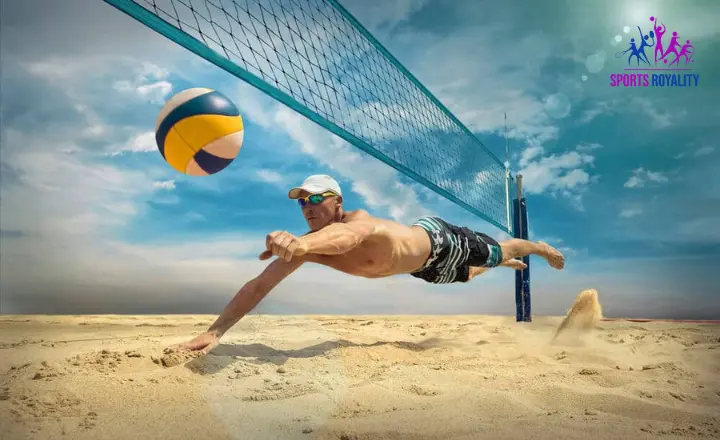
How Hard Is It To Make A Volleyball Team?
The difficulty level will vary depending on several factors, such as the team you are trying out for, your position, and your experience level. If you are trying out for a highly competitive team with experienced players, the competition may be fierce and the selection process more rigorous.
Your chances of making the team will increase with your previous volleyball experience and strong skills. It is important to showcase your abilities during tryouts by demonstrating good technique, agility, teamwork, and a positive attitude. Being open to learning from coaches and continuously improving your skills can also enhance your chances of cutting.
Making a volleyball team requires dedication, hard work, and perseverance. It may involve facing setbacks or rejection, but staying determined and focused on improving will increase your chances of achieving your goal.
Is Volleyball Hard To Master?
Volleyball can be hard to master, but with dedication and practice, it is achievable. Like any sport, it requires physical skills like agility, strength, and coordination and mental skills like strategy and teamwork.
The main difficulty in mastering volleyball is precise timing and technique. From serving to setting to spiking, each skill requires proper form and execution. The game’s fast-paced nature means players must quickly react and make split-second decisions.
Anyone can improve their volleyball skills with regular training and a willingness to learn from mistakes. It’s essential to break down each skill into smaller components and focus on perfecting those before moving on to more complex techniques. By practicing consistently and seeking guidance from experienced coaches or players, one can gradually master the volleyball game.
Final Words:
While volleyball may not be an easy sport, it is certainly not impossible to learn and master. The game’s physical demands can be challenging, but with proper training and practice, players can improve their skills and become proficient in the sport.
The strategic aspect of volleyball requires mental agility and quick thinking, making it a challenging yet rewarding experience. The camaraderie and teamwork fostered in volleyball also contribute to its appeal and make it worth the effort.
If you are ready for a challenge, it is hard to do the work. Try volleyball to discover a new passion and excel in this exciting sport.
FAQ’s:
Is Volleyball Harder Than Basketball?
The difficulty of volleyball versus basketball is subjective and can vary depending on individual preferences and skill sets. Both sports require different physical abilities and skills. Volleyball demands quick reflexes, agility, and coordination to pass, set, and spike the ball effectively. Basketball emphasizes endurance, speed, and dribbling skills to navigate the court and score points.
How Many Days Does It Take To Learn Volleyball?
The time it takes to learn volleyball can vary greatly depending on several factors, such as individual talent, dedication, and practice frequency. While it is true that becoming proficient in any sport takes time and consistent effort, it is not necessarily the case that it will take 3 to 4 years before you become decent at volleyball.

